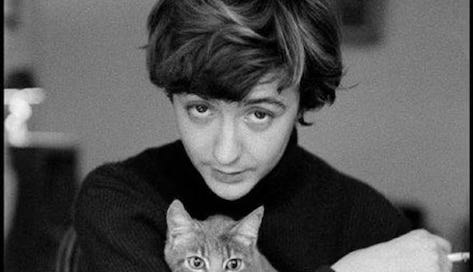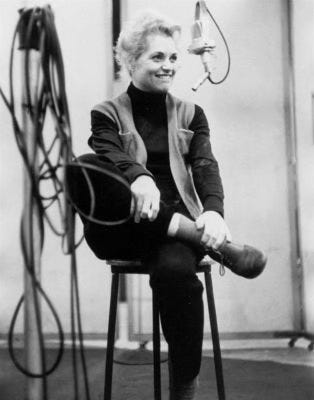SATURDAY RUBRICS: 6/21/25
Happy Birthday to Two Dead Literary Ladies, Three Dead Actresses, and The Dead Guy with that Existential Eye, or (sorry, Jean-Paul) Leurs Essences Succèdent à Leurs Existences
STARS IN BLACK TURTLENECKS: Françoise Sagan and Judy Holliday
Sagan published her first novel in 1954 when she was 18. Holliday died at the age of 43 in 1965.
Sagan won the Prix des Critiques for that debut work, Bonjour Tristesse. Françoise Mauriac wrote on the front page of Le Figaro at the time that "this Critics' Prize is awarded to a charming little eighteen-year-old monster whose literary merit is evident from the first page; it is not debatable.”
Holliday won the Best Actress Oscar in 1950 for her role in Born Yesterday in the same year that Bette Davis and Anne Baxter were nominated for All About Eve and Gloria Swanson received a nomination for Sunset Boulevard. Eleanor Powell was the fifth nominee for her role in the women’s prison film Caged. Holliday wasn’t there to accept her Oscar from her Born Yesterday costar Broderick Crawford, who had won the Best Actor Oscar the year before for portraying Willie Stark in All the King’s Men, so Ethel Barrymore emerged from the wings as the audience was erupting in astonished applause and cheers to quiet them with a slight wave of her hand and to accept the Oscar in her stead.
I would have probably been pulling for Powell as the underdog that year - especially against Davis who refused the role in Caged because of its lesbian content and reportedly rejected it by calling it “that dyke movie” even though ironically she was nominated for the role of Margo Channing which has become a gay-diva classic. I’ll never forget, in fact, the first time I saw All About Eve at the Theatre 80 St. Marks Cinema in the East Village and felt that I had finally gotten my New York City gay certificate. Walking back home to the West Village that night to my tiny 6th-floor walkup apartment at Bleecker and Sixth above the recently opened Da Silvano restaurant, I felt like a bona fide member of the gay community in a way that buggery and boners and fellatio had never quite made me feel, proving that such a feeling was not finally sexual but instead culturally accumulative while ironically accompanied by the aesthetic culling that occurs when a community is being discovered and, thus,(more irony) the self, the existential être-pour-soi as defined by the dead guy with that eye for such things.
But I digress.
Garson Kanin wrote the play Born Yesterday originally for his friend Jean Arthur but she dropped out of the production during tryouts in New Haven and Boston and Holliday was hired three days before the opening night in Philadelphia and went on to a star-making triumph on Broadway in 1946 as Billie Dawn, the slyly dumb girlfriend of a junkyard mogul named Harry Brock played onstage by Paul Douglas. An everything-connects aspect of it all is that Gary Merrill, who starred opposite Bette Davis, in All About Eve, with whom he fell in love during the filming and married a few weeks after the film wrapped, played Holliday’s young leading man love interest named Paul Verrall in the Broadway production of Born Yesterday , the role that William Holden played in the film version although Holden was nominated for an Oscar for his other role in Sunset Boulevard.
Harry Cohn at Columbia Pictures wanted the rights to the play but Kanin said he wouldn’t sell the rights to Cohn, whom he detested, for even a million bucks. So Cohn offered him just that amount. Kanin’s detestation was put to the test; he failed but succeeded. The million bucks went into Kanin’s bank account and the vulgarian Cohn became the owner of the play. Cohn, however, was quoted as saying in reference to Holliday that he didn’t want “that fat Jewish broad” in his movie. He then spent a couple of years trying to cast it.
In the meantime, Kanin and his wife, Ruth Gordon, wrote Adam’s Rib for Katharine Hepburn and Spencer Tracey which was to be directed by George Cukor who was also set to direct Born Yesterday. They wrote a supporting role for Holliday and Cukor cast her in it in an asymmetrical attempt to get her the screen role in Born Yesterday that she had created with such success onstage in New York. Hepburn was in on the plot-within-a-plot and showed her unfailing generosity in their scenes and Cukor made sure that Holliday was costumed beautifully and filmed to her best advantage. It worked - Holliday was again a sensation and audiences and critics fell for her supporting performance in Adam’s Rib - so much so that Cohn finally gave her an official screen test but nastily scheduled it early on the Sunday that year which fell on Father’s Day knowing that a disgruntled crew of fathers had to show up to work on it . Broderick Crawford was in the scene with her. He had turned down the role of the garbage mogul on Broadway because he didn’t want to work with Jean Arthur. But he had accepted the screen role, and yet he had grown bored by all the actresses having already been tested and proved to be an apathetic screen partner. With the continuing championing of Holliday by Katharine Hepburn and Kanin and Cukor, Cohn finally relented. Holliday got the role.
When the film was released in late December of 1949, just in time to be eligible for the Oscars, Bosley Crowther in The New York Times was ecstatic in his praise for the film and for Holliday.
He wrote in his opening paragraphs:
“Just in time to make itself evident as one of the best pictures of this fading year is Columbia's trenchant screen version of the stage play, Born Yesterday. More firm in its social implications than ever it was on the stage and blessed with a priceless performance by rocketing Judy Holliday, this beautifully integrated compound of character study and farce made a resounding entry at the Victoria yesterday.
“On the strength of this one appearance, there is no doubt that Miss Holliday will leap into popularity as a leading American movie star—a spot to which she was predestined by her previous minor triumph in Adam's Rib as the tender young lady from Brooklyn who shot her husband (and stole the show). For there isn't the slightest question that Miss Holiday brings to the screen a talent for characterization that is as sweetly refreshing as it is rare.
“Playing the wondrous ignoramus that she created on the stage—the lady to whom her crude companion rather lightly refers as a ‘dumb broad’ this marvelously clever young actress so richly conveys the attitudes and the vocal intonations of a native of the sidewalks of New York that it is art. More than that, she illuminates so brightly the elemental wit and honesty of her blankly unlettered young lady that she puts pathos and respect into the role.”
Holliday married David Oppenheim in 1947 after his then boyfriend, Leonard Bernstein, told him to marry her “as your beard” although Oppenheim went on to marry two other women and father three children. Oppenheim was a classical clarinetist who became a successful record and television producer and later the second Dean of New York University’s Tisch School of the Arts from 1969 to 1991. Matt Bomer played him in the Bradley Cooper film about Bernstein’s life.
"Only by pursuing the extremes in one's nature, with all its contradictions, appetites, aversions, rages, can one hope to understand a little — oh, I admit only a very little — of what life is about,” the bisexual Francois Sagan wrote. “It's not doubt that drives people crazy, it's certainty that does."
Billie Dawn: “It's interesting how many interesting things a person could learn - if they read.”
###
Judy Holliday born on June 21, 1921
Francoise Sagan born on June 21, 1935
[TO READ AND VIEW THE REMAINING RUBRICS THIS WEEKEND, PLEASE CONSIDER JOINING OUR PAID SUBSCRIBER COMMUNITY FOR ONLY $5 A MONTH OR $50 A YEAR. THANKS SO MUCH. I’M GRATEFUL.]





